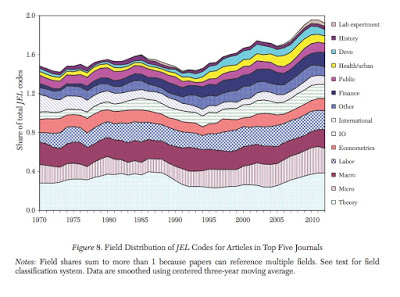Summary:
Nothing more profound here on the perils of being an economist. And nothing (not in this post, at least) on the interest rate hike (more on that later; it will be announced at 2pm). Just a table I came across from a paper by Card and DellaVigna (see here) on the fields of papers published in the five top mainstream journals.*The authors suggest that "the relative shares of the different fields are fairly constant over time: theory is the largest field, accounting for about 30 percent of all articles; macro is next (about 20 percent of papers); labor and microeconomics are tied for third (16–17 percent each); and econometrics, IO, and international each account for about 10–12 percent of papers)." However, you can notice (or so it seems visually) that the Lab Experiment field now appears clearly, and that Development, Health, Finance and IO have grown over time. I would prefer to have the graph with the shares of fields.Perhaps more interestingly the authors note that "papers in Development and International Economics published since 1990 are more highly cited than older (pre-1990) papers in these fields, whereas recent papers in Econometrics and Theory are less cited than older papers in these fields." More experiments, less citation of theory and more citations of development and and international. That's what mainstream economists have been doing.
Topics:
Matias Vernengo considers the following as important: Journals, Mainstream
This could be interesting, too:
Nothing more profound here on the perils of being an economist. And nothing (not in this post, at least) on the interest rate hike (more on that later; it will be announced at 2pm). Just a table I came across from a paper by Card and DellaVigna (see here) on the fields of papers published in the five top mainstream journals.*The authors suggest that "the relative shares of the different fields are fairly constant over time: theory is the largest field, accounting for about 30 percent of all articles; macro is next (about 20 percent of papers); labor and microeconomics are tied for third (16–17 percent each); and econometrics, IO, and international each account for about 10–12 percent of papers)." However, you can notice (or so it seems visually) that the Lab Experiment field now appears clearly, and that Development, Health, Finance and IO have grown over time. I would prefer to have the graph with the shares of fields.Perhaps more interestingly the authors note that "papers in Development and International Economics published since 1990 are more highly cited than older (pre-1990) papers in these fields, whereas recent papers in Econometrics and Theory are less cited than older papers in these fields." More experiments, less citation of theory and more citations of development and and international. That's what mainstream economists have been doing.
Topics:
Matias Vernengo considers the following as important: Journals, Mainstream
This could be interesting, too:
Matias Vernengo writes What is heterodox economics?
Matias Vernengo writes Life among the Econ: fifty years on
Matias Vernengo writes Inequality and Stagnation by Policy Design
Steve Keen writes The Unreal Basis of Neoclassical Economics
Nothing more profound here on the perils of being an economist. And nothing (not in this post, at least) on the interest rate hike (more on that later; it will be announced at 2pm). Just a table I came across from a paper by Card and DellaVigna (see here) on the fields of papers published in the five top mainstream journals.*
The authors suggest that "the relative shares of the different fields are fairly constant over time: theory is the largest field, accounting for about 30 percent of all articles; macro is next (about 20 percent of papers); labor and microeconomics are tied for third (16–17 percent each); and econometrics, IO, and international each account for about 10–12 percent of papers)." However, you can notice (or so it seems visually) that the Lab Experiment field now appears clearly, and that Development, Health, Finance and IO have grown over time. I would prefer to have the graph with the shares of fields.
* The top five mainstream journals according to the authors are the American Economic Review, Econometrica, the Journal of Political Economy, the Quarterly Journal of Economics, and the Review of Economic Studies.
The authors suggest that "the relative shares of the different fields are fairly constant over time: theory is the largest field, accounting for about 30 percent of all articles; macro is next (about 20 percent of papers); labor and microeconomics are tied for third (16–17 percent each); and econometrics, IO, and international each account for about 10–12 percent of papers)." However, you can notice (or so it seems visually) that the Lab Experiment field now appears clearly, and that Development, Health, Finance and IO have grown over time. I would prefer to have the graph with the shares of fields.
Perhaps more interestingly the authors note that "papers in Development and International Economics published since 1990 are more highly cited than older (pre-1990) papers in these fields, whereas recent papers in Econometrics and Theory are less cited than older papers in these fields." More experiments, less citation of theory and more citations of development and and international. That's what mainstream economists have been doing. It would be interesting to see what the heterodox ones have been up to in the same period.
* The top five mainstream journals according to the authors are the American Economic Review, Econometrica, the Journal of Political Economy, the Quarterly Journal of Economics, and the Review of Economic Studies.


No comments:
Post a Comment